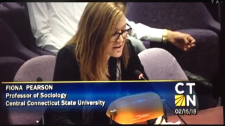I am Fiona Pearson, Professor of Sociology at Central Connecticut State University, Co-Chair of the Work Life Balance Subcommittee of the Committee on the Concerns of Women, and President of the Board of Directors of the Early Learning Program @ CCSU. This latter organization is a pre-school in New Britain that provides early childhood education for 26 children who are between ages 3 and 4—9 of those children have parents who are studying full or part time at CCSU and 2 are parents who work at Central.
Since joining the faculty in 2007, I have worked with a number of colleagues across the system to address child care, maternity and paternity leave, elder care and personal wellness needs of faculty, staff, and students.
Although we have initiated a number of conversations with various stakeholders, and nearly everyone we have talked with supports the idea of expanding family-friendly resources, they nonetheless feel bound by diminishing state resources. Unless, you are a CT corporate leader or millionaire, whose investments have steadily increased in recent decades and who will benefit grandly from these recent tax cuts, the rest of us live in an era of declining resources—our university system budgets are cut year after year. Between 2008 and 2017 state spending has been reduced by $1,951 per student (CBPP 2017). We are among 13 states, none of them in New England, that continue to cut higher education funding. During the same 2016-2017 year that we cut per student spending by $647, Massachusetts, Rhode Island and New York all increased funding from between $237 and $283 per student (CBPP 2017).
We strongly believe that our higher educational institutions should be serving as models to corporations and companies, demonstrating best practices for attracting and retaining top notch faculty, staff and students, particularly women who are disproportionately burdened by familial caregiving responsibilities.
We wish to share with you just a few national statistics from a 2017 report regarding the current state of parenting on campus:
- 26% of undergraduates are student parents (IWPR 2017)
- 71% of those student parents are women (IWPR 2017).
- 43% of all undergraduate student parents are single mothers (IWPR 2017).
- In 2011, 47% of black women students, 32% of Latina or Hispanic women students, and 29% of white women students were parents. (IWPR 2017).
If we had drop in centers on campus that provide intermittent care so that students can attend study groups, go to the library, or even attend class; if we had regular childcare for toddlers and infants; if we stopped increasing tuition and provided resources for these parents so they can be successful in school and establish careers so that they can provide for their families; then colleges and universities could actually serve as role models in our communities.
But instead, it’s cut, cut, cut. Instead gender and racial inequalities are perpetuated throughout our state. Instead we look for short-term solutions to address current deficits and make ludicrously sensible, revenue-generating proposals like implementing tolls or raising taxes on our wealthiest citizens to match those of neighboring states, sound impossible. I urge you to reinvest in our public higher educational institutions. We need to provide necessary services to our students and to stop passing on the costs of going to college to their already cash-strapped, debt-ridden families. I appreciate your listening today.
(CBPP) Mitchell, Michael, Michael Leachman, and Kathleen Masterson. 2017. “A Lost Decade in Higher Education Funding.” Washington D.C.: Center on Budget and Policy Priorities. https://www.cbpp.org/research/state-budget-and-tax/a-lost-decade-in-higher-education-funding.
(IWPR) Noll, Elizabeth, Lindsey Reichlin, and Barbara Gault. 2017. College Students With Children: National and Regional Profiles. . Washington DC: Institute for Women’s Policy Research. Available: https://iwpr.org/wp-content/uploads/2017/02/C451-5.pdf

